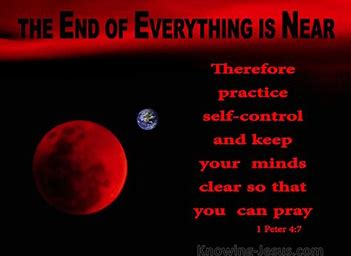Historians and historical philosophers present history as a development from age to age and from moment to moment, each step always coming nearer and nearer to the highest possible development and evolution, provided that the guiding idea is belief in progress. Today then determines tomorrow; and today was determined by yesterday. Cause and effect, as he observes it, engages the thought of the historian. The New Testament view of history and the flow of time is an altogether different one: “The end of all things is at hand” (l Peter 4: 7), It would be a serious mistake to date this end or to be misled by speculations which have in the past brought discredit to Christian hope. One thing we know with solid certainty: “The end of all things is at hand.” This end gives direction to everything. Everything must be interpreted with this end in view. So the directional lines do not run from the present out to some ephemeral, evolutionary goal somewhere in the remote future, but they run from the end, that is, the consummation of the Kingdom, to the present and determine the present. Hence, from this point of view history does not repeat itself. We need to take the end of this present world form and age as seriously as we take our own death. “You know what hour it is” (Rom. 13: 11) . “Keep your ear to the ground,” Paul says. Every political movement, every social upheaval, every scientific development, forces the question upon us: What light does the end shed on this event, this discovery, this new thought? The minute hand of the clock of this age is steadily moving on and is nearing the point at which the clock will strike twelve. August Rehwald
About The Author
Rev. Bernie Seter
Rev. Bernhard Seter has been a Pastor in the Lutheran Church—Missouri Synod for over 42 years. He served on the Board of LCMS World Relief and Human Care for ten years and is now the Chairman of the Board of International Missions. He has been privileged to travel around the world and see the churches' mercy work in action. He is convinced it is not only what we are "compelled" to do because of Christ; it is what we have been baptized for. Christ's love compels us, constrains us, and sends us forth.
Related Posts
Search
Blogroll
please note:
Your comments are welcome but will be held until approved to avoid misuse.
Comments posted by visitors to this site reflect the personal opinions of individuals and may not necessarily reflect the beliefs and practices or official positions of The Lutheran Church--Missouri Synod.
Individual articles from this blog may be reproduced by LCMS congregations (i.e., in church newsletters, bulletins, etc.) without writing for permission. Such reproductions, however, should credit the "Northern Crossings" blog as the source.
Archives
Tags
Bill Sharpe
Brother John
colonialism
Concordia Seminary St. Louis
Dahlstrom Motors
disaster
ebola
Erik Herrmann
flood
floods
Hilary
IRS
Justice
Ken Weinlaeder
Kenya
Law
LCMS
LCMS World Relief and Human Care
Luther
Lutheran Malaria Initiative
Lutheran Womens Missionary League
LWML
Mary Okeyo
Mercy
Minnesota North
Minot
mission
Missions
NFL Football
Northern Lights
prayer
Project 24
Rochester Central Lutheran School
State Department
Tea Party
terrorists
Tim Tebow
truth
Vikings
volunteers
Wadena
Wadena MN.
Wenceslas
Williston
Witness


